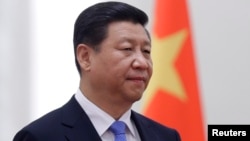China's President Xi Jinping has told police and prosecutors not to overstep the law, in a speech intended to ease public concern over corruption and lack of redress in the country's legal system.
The remarks came during an annual meeting in Beijing on political and legal work that ended Wednesday.
Analysts say that while Xi stressed the need for greater accountability, his remarks are in fact strengthening the party's authority over the judiciary.
By taking the unusual step of chairing the meeting himself, Xi Jinping wanted to signal his leadership role over China's national security, says political scientist Willy Lam.
“What Xi Jinping said yesterday was that the party should have tight control over the legal and judicial apparatus,” Lam says. “This is a turning back of the clock, we are witnessing a return to a more authoritarian, strongman style of administration.”
In his speech, Xi said the party should lead legislation, ensure law enforcement and set an example by obeying the law.
“Cadres should not overstep the limitations of laws, abuse their power and bend the law for their personal gain,” China's news agency Xinhua reported Xi as saying.
Such pronouncements are seen as part of the new leadership's mantra of cleaning up its ranks, especially among the judiciary and security organs.
Legal scholar He Jiahong says that such warnings respond to public mistrust of the judicial system. “In recent years, some flaws and shortcoming in the Chinese legal system have become apparent," he says, "like wrongful convictions for example, and people's demands for justice have increased.”
Xi also called for the establishment of an accountability system for courts and prosecutors, but he did not give details on how the system would work.
He Jiahong says that such an oversight is a necessary step to avoid future abuses.
“We need all judiciary staff to be held accountable for their work,” he says. “Wrongful convictions have happened in the past because local courts are not responsible in their work.”
Last year, China took a number of steps to change some of its most controversial practices, such as the system of detention without trial, or laojiao.
China's Supreme Court has outlined measures to prevent unjust judicial decisions, including an official condemnation of forced confessions and persecution of lawyers.
“There is a general message that the entire political and legal apparatus including the judiciary must do a better job in resolving contradictions within the people,” says Lam, “A lot of the riots and disturbances come about because the legal and judicial system is very corrupt.”
By eliminating the most brazen forms of abuse, analysts say, the party is appeasing the public while maintaining strict control over the courts and police.
According to Xinhua, opinion polls done in recent months indicate that public sentiment about China's legal reform is high and people's sense of security, as well as their satisfaction of the legal system, is rising.
This, Xinhua says, is deeply linked with the party's handling of the law.
The remarks came during an annual meeting in Beijing on political and legal work that ended Wednesday.
Analysts say that while Xi stressed the need for greater accountability, his remarks are in fact strengthening the party's authority over the judiciary.
By taking the unusual step of chairing the meeting himself, Xi Jinping wanted to signal his leadership role over China's national security, says political scientist Willy Lam.
“What Xi Jinping said yesterday was that the party should have tight control over the legal and judicial apparatus,” Lam says. “This is a turning back of the clock, we are witnessing a return to a more authoritarian, strongman style of administration.”
In his speech, Xi said the party should lead legislation, ensure law enforcement and set an example by obeying the law.
“Cadres should not overstep the limitations of laws, abuse their power and bend the law for their personal gain,” China's news agency Xinhua reported Xi as saying.
Such pronouncements are seen as part of the new leadership's mantra of cleaning up its ranks, especially among the judiciary and security organs.
Legal scholar He Jiahong says that such warnings respond to public mistrust of the judicial system. “In recent years, some flaws and shortcoming in the Chinese legal system have become apparent," he says, "like wrongful convictions for example, and people's demands for justice have increased.”
Xi also called for the establishment of an accountability system for courts and prosecutors, but he did not give details on how the system would work.
He Jiahong says that such an oversight is a necessary step to avoid future abuses.
“We need all judiciary staff to be held accountable for their work,” he says. “Wrongful convictions have happened in the past because local courts are not responsible in their work.”
Last year, China took a number of steps to change some of its most controversial practices, such as the system of detention without trial, or laojiao.
China's Supreme Court has outlined measures to prevent unjust judicial decisions, including an official condemnation of forced confessions and persecution of lawyers.
“There is a general message that the entire political and legal apparatus including the judiciary must do a better job in resolving contradictions within the people,” says Lam, “A lot of the riots and disturbances come about because the legal and judicial system is very corrupt.”
By eliminating the most brazen forms of abuse, analysts say, the party is appeasing the public while maintaining strict control over the courts and police.
According to Xinhua, opinion polls done in recent months indicate that public sentiment about China's legal reform is high and people's sense of security, as well as their satisfaction of the legal system, is rising.
This, Xinhua says, is deeply linked with the party's handling of the law.












